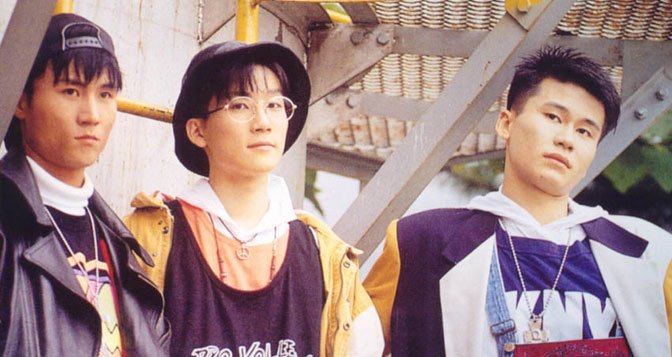written by Tsuvi
Kpop has always fascinated me, especially its history and evolution. From its humble beginnings as a niche genre in South Korea, it has now become a global phenomenon with millions of fans worldwide. What's interesting is that Kpop has undergone significant changes since its inception in the 1990s, and this evolution can be traced back to the early Kpop groups.
The Early Days (1990s-2000s)
One of the most significant groups in Kpop history that revolutionised the genre is Seo Taiji and Boys. They were formed in 1991 by Seo Taiji, a former member of the heavy metal band Sinawe. Seo Taiji and Boys were known for their fusion of Western pop, hip hop, and rock music, which was a departure from the ballads and folk songs that dominated the Korean music scene at the time. Their debut single, "Nan Arayo" (I Know), was an instant hit and marked the beginning of a new era in Korean music, as their music style and image were radically different from anything that had been seen before. Their unique sound and style appealed to a younger generation of South Koreans, and their influence quickly spread beyond the country's borders.

Seo Taji & Boys credited with inspiring the kpop genre
Following the success of Seo Taiji and Boys, other Kpop groups emerged, including H.O.T., S.E.S, and Shinhwa. These groups continued to push the boundaries of the genre. They also paved the way for future generations of Kpop groups by establishing the blueprint for successful idol groups in South Korea.
H.O.T. (High-Five Of Teenagers) is another influential Kpop group from the 1990s. They were formed in 1996 by SM Entertainment and quickly gained a massive following among Korean teenagers. H.O.T.'s music was characterised by catchy pop melodies and synchronised dance routines, which became a signature style of Kpop. They were also known for their elaborate stage performances and flashy costumes, which set a new standard for Kpop idol groups. I’d say they also played a significant role in popularising the "fan culture" which is now a hallmark of Kpop fandoms, where fans go to great lengths to support their favourite groups. This included things like buying multiple copies of albums, attending concerts and events, and creating fan clubs. The dedication of these early Kpop fans helped to create a sense of community and belonging around the genre.

H.O.T a five member boy band widely considered to be one of the pioneers of Kpop
S.E.S. (Sea, Eugene, Shoo) was another popular Kpop group that emerged in the late 1990s. They were known for their upbeat, bubblegum pop sound, and their music was aimed primarily at a female audience. They also had a significant impact on the Korean fashion industry, popularising the "schoolgirl" look that became a trend in the late 1990s and early 2000s.
Shinhwa was a Kpop group that debuted in 1998 and is known for its longevity. They were one of the longest-running Kpop groups, and their popularity spanned several decades. They were known for their unique blend of pop, rock, and R&B, and their music was popular with both male and female audiences.
The Rise of SM Entertainment (mid-2000s)
In the mid-2000s, the Kpop industry saw a shift in power as SM Entertainment emerged as the leading agency in the industry. SM Entertainment, founded in 1995 by Lee Soo-man, had been around for a while but only began to rise to prominence in the mid-2000s.
One of the key factors in SM Entertainment's success was their emphasis on "idol groups," which were groups consisting of multiple members who sang, danced, and acted. The agency had already debuted successful idol groups such as H.O.T. and Shinhwa in the past, but it was with the debuts of TVXQ in 2003 and Super Junior in 2005 that they really solidified their position as a leading force in the industry.
TVXQ, also known as Dong Bang Shin Ki, quickly became one of the most popular groups in Korea and Japan, having sold over 10 million records worldwide. They were known for their strong vocals and impressive dance skills, and they paved the way for future Kpop groups to expand their reach beyond Korea and into other Asian markets.

Lee Soo Man, TVXQ & Kim Min Jong
Super Junior, on the other hand, was a massive group consisting of 13 members. They were known for their fun and catchy music, as well as their playful and energetic stage performances. They quickly gained a large following, and their success helped to cement SM Entertainment's position as the dominant agency in the Kpop industry.
SM Entertainment's success was not limited to just TVXQ and Super Junior, however. The agency also debuted other successful groups such as Girls' Generation, SHINee, and f(x), among others. These groups helped to solidify SM Entertainment's position as a leading force in the Kpop industry, and their influence continues to be felt to this day.
The Big Three (late-2000s)
As the Kpop industry continued to grow and evolve in the late-2000s, three agencies emerged as the dominant players in the industry. These three agencies - SM Entertainment, YG Entertainment, and JYP Entertainment - came to be known as the "Big Three" and their influence continues to be felt in the industry to this day.

SM Entertainment had already established itself as a leading force in the industry, with the success of TVXQ and Super Junior. YG Entertainment, on the other hand, had made a name for itself with the debuts of popular groups such as Big Bang and 2NE1.
Big Bang, which debuted in 2006, quickly became one of the most popular groups in Kpop history. Known for their unique style and sound, they helped to usher in a new era of Kpop music that was heavily influenced by hip-hop and electronic music. BIGBANG's music and image were a departure from the polished and synchronised style of Kpop that was popular at the time. They were also one of the first Kpop groups to write and produce their own music, which gave them greater artistic control and helped to establish them as a major force in the industry. Their success helped to establish YG Entertainment as a major player in the industry.
JYP Entertainment, meanwhile, had been around since the 1990s but only really rose to prominence in the late-2000s. The agency had already debuted successful groups such as g.o.d. and Wonder Girls in the past, but it was with the debuts of 2PM and Miss A that they really established themselves as a force to be reckoned with.
The Wonder Girls were a Kpop girl group that made their debut in 2007. They were known for their retro-inspired sound and image, which drew inspiration from 1960s and 1970s pop music. The Wonder Girls gained international attention in 2009 with their hit single "Nobody," which topped the charts in several countries and became one of the most successful Kpop songs of all time. They were also the first Kpop group to chart on the US Billboard Hot 100.

2PM was a popular boy group known for their impressive dance skills and masculine image. Miss A, on the other hand, was a girl group known for their strong vocals and unique style. Both groups were immensely popular, and their success helped to establish JYP Entertainment as one of the Big Three agencies in the industry.
The Global Phenomenon (2010s)
The 2010s marked a turning point for Kpop as it evolved from a niche genre in South Korea to a global phenomenon with millions of fans around the world. This era saw the rise of Kpop groups with international appeal, as well as the expansion of the industry into new markets.
One of the biggest factors in the global success of Kpop was the emergence of social media platforms such as YouTube and Twitter. These platforms allowed Kpop groups to reach a wider audience outside of Korea, and enabled fans to connect with their favourite groups and share their content with others. In a later article, I will discuss more on significant changes Kpop has undergone over the years, but let's continue.

BTS attending the Grammys
One of the most successful Kpop groups of this era was undoubtedly BTS. Debuted in 2013 under the agency Big Hit Entertainment, BTS quickly gained a massive following both in Korea and abroad. Known for their socially conscious lyrics and impressive dance skills, they were one of the first Kpop groups to gain mainstream success in the United States and Europe.
Other Kpop groups that gained international success in the 2010s include BLACKPINK, EXO, TWICE, and Red Velvet, among others. These groups all had unique styles and sounds, and their success helped to showcase the diversity of Kpop music to the world.
The future of Kpop
The future of Kpop looks bright and promising, with the industry continuing to grow and evolve in exciting ways. One trend that is likely to continue is the internationalisation of Kpop, with more and more groups targeting global audiences and collaborating with Western artists.
In addition, there is likely to be a continued emphasis on diversity and representation in Kpop, with more groups featuring members from different backgrounds and nationalities. This trend has already begun with groups such as NCT and SuperM, which feature members from various countries and regions.
Another trend that is likely to continue is the blending of different music genres and styles in Kpop. Over the years, Kpop has drawn inspiration from a wide range of musical genres, including hip-hop, R&B, EDM, and rock. This blending of genres has helped to make Kpop unique and distinctive, and is likely to continue to be a hallmark of the industry in the future.
My opinion
When I think about the early days of Kpop, I can't help but feel a sense of nostalgia and admiration for the artists and groups that paved the way for the industry we know today. Despite the challenges and obstacles they faced, these early pioneers were driven by a passion for music and a desire to share their talents with the world.
One of the things that I find most interesting about this era of Kpop is how much it was influenced by Western music, particularly hip-hop and R&B. Many of the early Kpop groups, such as Seo Taiji and Boys and H.O.T., incorporated elements of these genres into their music and style, creating a unique sound that helped to differentiate Kpop from other genres in Asia.









